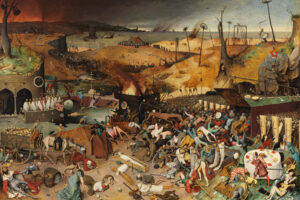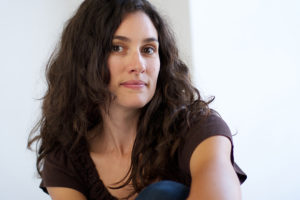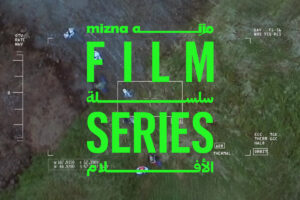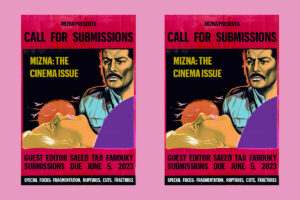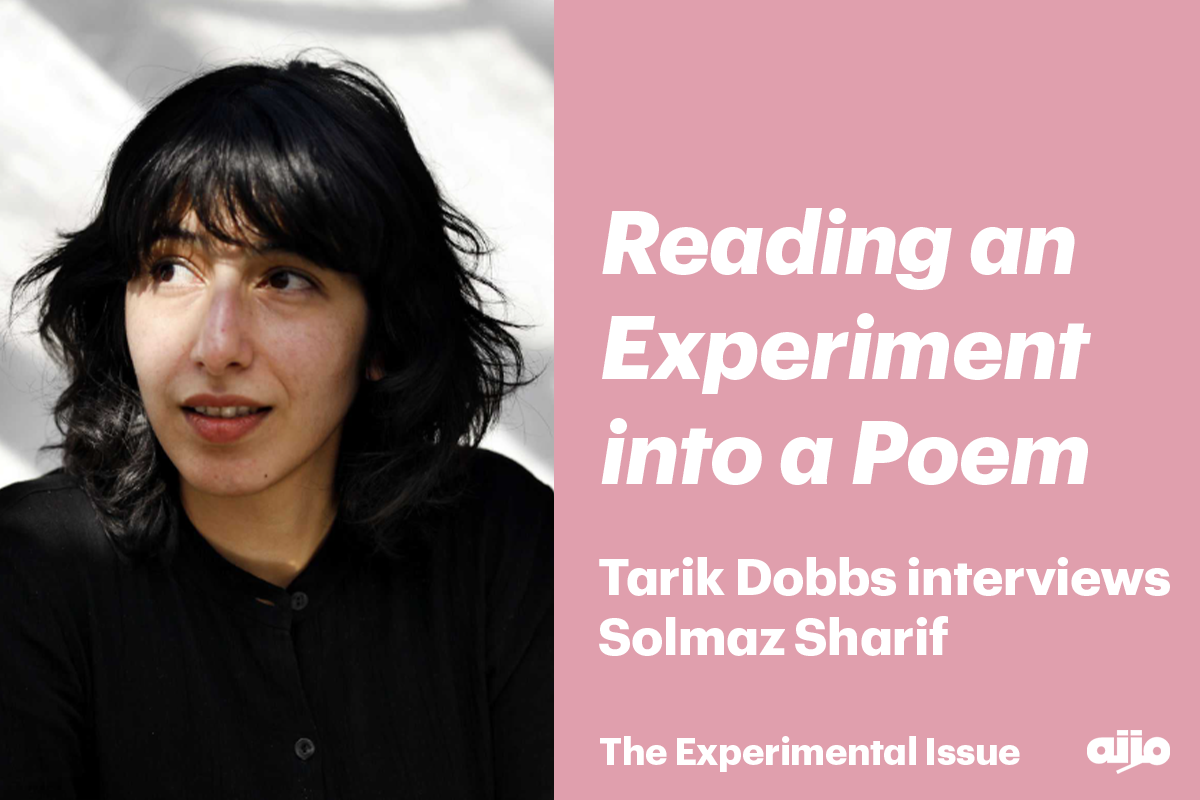
March 3, 2022
Reading an Experiment into a Poem—Tarik Dobbs interviews Solmaz Sharif
Biographical Info
interview by Tarik Dobbs
This text is published as part of Mizna: The Experimental Issue, guest-edited by Tarik Dobbs. Available to order here.
In my first poetry class in college, I was assigned Solmaz Sharif’s poetry collection, Look. It blew me away not only for its revolutions in language, but for its humor, its will to survive and tell the story. In my early poetry experimentations, Sharif’s work is mimicked and echoed. I couldn’t put together this experimental issue without her.
—Tarik Dobbs, Guest Editor for Mizna 22.2: Experimental Issue
Reading an Experiment into a Poem
TARIK DOBBS
Frequently, poetry collections are either lauded or derided for being “topical” at the time of their release. Yet, thanks to endless US militarism, Look feels just as relevant now—five years later—as it did when it came out. Looking back, has your understanding of the collection changed against the current iterations of the US’s continuous, murderous military presence overseas? And what was it like to publish this collection under the American critics’ gaze?
SOLMAZ SHARIF
I’m not sure that I have an answer to that. The criticism of a poetry collection being topical, timely, important, or whatever is often a thinly veiled white and imperial supremacy. So that certain lives and certain bodies—and certain narratives—will always be read as topical. Certain content will always be read just as content. It doesn’t even matter what the sentences are doing, doesn’t matter what the lines are doing; all considerations of form go right out the window. And that’s how our work is kind of dismissed.
I have to resist the impulse to fall into a slowly reactive mode of writing in which the US does something, and then I write a poem in response. And the US does something again, and I write another poem in response. And that to me is important but is not sufficient.
And, so, with Look—a large part of my reason to write it was I did not see poets in the US actually grappling with the Wars on Terror. And it was chilling to go to readings and hear lyrical poems that have nothing to do with anything . . . I shouldn’t say that, but that’s what it felt like. It felt like my skin was on fire. I wanted to disrupt those rooms and bring these poems into those spaces.
Something has shifted in Customs where I am not responding to news items or immediate moments, and, instead, the actual syntax of power that is operating in Look carries into Customs. But a lot of the nouns are kind of removed. You ask about the “American critic”—I guard myself against their gaze; I guard myself against a critical gaze, period. I don’t want that to become my yardstick.
TD
As someone currently doing archival research for a poetry project, I appreciate the path you’ve laid in Look. I’m working in the Henry Ford archive, and I find myself slowly working my way back through time to the early 1900s. Inspired by your approach in Look, I try to go for projects that I think haven’t been written about, and no one’s written out of this archive.
SS
I like that because there is this way that bringing in something not yet being looked at in poetry or literature allows for a didactic moment. As one is writing these poems, they are also exposing people to this information.
And I’m thinking now of one of the books that guided a lot of my writing, Book of the Dead by Muriel Rukeyser, which is not dealing with archives, but dealing in actual interviews of living miners and their families in the face of this labor disaster.
What saves for me a documentary project, or impulse, or poem, is that we’re really not supposed to talk about making good poetry in the US—which is the “didactic angle,” or, in other words, as Rukeyser is writing Book of the Dead, Rukeyser is writing a lyrical masterwork that is formally rigorous but simultaneously educating the reader on this labor disaster. And the point of that education, actually, is to change labor policy; as in, she has an agenda behind the writing, which flies right in the face of the poet’s “job” as one that meditates in and marinates in capability.
TD
In Customs, are you working inside any archives or any documents in particular?
SS
I am always working in documents, and, as I started Customs, I thought it would be a lot more documentary. So, I did a lot of research into Japanese American incarceration during World War II, transcripts from deportation cases, and other materials that lay bare what it means to be a “quiet, good American citizen.” And what are the values? And how do those values play out on immigrant bodies?
The book began with me exploring the customs of the US as it relates to immigration and migration, but it became about the customs of American literature and the quiet values that are underpinning our behavior as writers, and what we are expected to culturally produce in order to be upstanding American and literary citizens. I was surprised that it turned in that direction, but I couldn’t quite help it, because I couldn’t help but see the relationship between the arrivals hall and the customs gate there, and the actual gate keeping in literature and academia as well.
TD
What does experimentation or experimental writing mean to you? Do you conceptualize experimentation in your writing process?
SS
I don’t know that I do. I’m thinking of Wendy Trevino’s biography that said, and I don’t know if it still says this “Wendy Trevino is not an experimental poet.” And I love that. But I don’t really think about it all that much.
A work is treated as experimental more often when it does not have nonwhite content associated with it, and as soon as nonwhite content appears, it becomes a gimmick instead. I try to not even pay attention to that. This question kind of runs parallel to What is a political poem? In the case of both questions, we can go writer by writer and gather answers.
But I think what’s far more interesting is: What would be a political reading of a poem? What would it mean to read an experiment into a poem? How do we make these questions of reading rather than questions of writing? My greatest hope is in these more revolutionary ways of reading, rather than the appliance of a type of vanguard that might have the right answers.
TD
Do you write with others? Do you have community in any stage of your writing?
SS
Putting aside the fact that no one is actually alone, and no one is ever really producing from their lonesomeness. It is all, actually, a collective and collaborative enterprise. Meaning whatever I do write is a metabolization of all the conversations that I’ve had with friends and with poets living and dead, and everything else I come across.
I tend to draft my poems alone. I have a few readers that I trust with early readings of poems. Roger Reeves is one, Fady Joudah is one, Ari Banias is one. And they can see the next draft. I’m finding that my community of writers are the ones who know what the other person is doing enough to pose questions when they need to be posed and then get out of the way of it.
But I don’t know that I ever felt that I’ve had a community, to be honest—outside of the time I was in Poetry for the People at Berkeley. I’ve always felt a little nomadic. I’ve moved between a lot of places and people, but I don’t claim any of them, loyal as I would be to them. And I’m really lucky for that, and I’m lucky for whoever’s next. And I don’t even realize it yet.
TD
Look was one of the first ten or so poetry books I read. And part of my excitement for it was the humor, the dark comedy. Do you see humor as playing a role in your poetics?
SS
Yeah, thanks for noticing the humor! I think I get read as a very serious poet and person, and in a lot of ways that I am. But, there’s this way that abject catastrophe makes us turn to certain things. And one of those things is of course grief, but the other one is actually humor.
So many conversations with people that I love seem to just approach the edge of the void. And you have nowhere else to go, and that’s where you crack the joke. And you don’t need to figure out “the where” anymore, you’re alive again. And, so I’ve always held onto that as a person and in my spirit. And also I like this kind of ironic trickery that humor can afford. You know, you’re smiling but you’re actually insulting the nation. I think of my poems as laced with arsenic. I think the humor is where things can be seen most clearly. That’s where the mask kind of breaks.
TD
In your essay “The Near Transitive Properties of the Political and Poetical: Erasure,” you talk about your uncle who was killed in the Iran Iraq War, and the letters he left behind. I related to your preference for muddling your way through the letters with your broken Farsi over the “in-authenticity” of asking a family member to translate them, wanting to capture in your reading, the truth of the way you would have had difficulty in speaking with him. I’m thinking about how, for many South West Asian/North African people who grew up in the global West, it can be difficult to navigate relationships, to find authenticity in translation. Or transliteration. Or even just writing in English. You wrote this essay almost eight years ago; how are you thinking these days about “authenticity” and the languages we inherit in our work?
SS
Thanks for that question. I had totally forgotten that I used that word. And I had to go back and read it again. I don’t know that I’d use “inauthentic” today, and I’m happy to have this conversation and this exploration. I think I meant that it would be a lie if I’m writing the poem from the translation of the letters without showing that I can’t do that myself. The loss is double: the loss of my uncle and the loss of the language that would allow me to access him without an intermediary..
I think instead of trying to cover up that loss or moving quickly into giving the content of it. For me, it’s never about the content as much as it’s about the limitations of the content and the limitations of the writer in face of the content. So I would be lying if I only gave the translation without telling the reader about the struggle of the translation.
It’s funny, my aversion to abstract nouns is part of what led me to poetry to begin with. I find it harder to talk about them, and easier to “do,” and to point to concrete things, and to put things next to each other. Which may or may not say something about authenticity or experimentation. Those words are rarely in my head. I have made peace with the knowledge that I will be forever inauthentic. I think authenticity is a myth and a mirage. It is something that is afforded to us in brief moments, in brief shelters, but doesn’t truly exist. And there is no space and there is no collective within which I will ever, in my own lived life, belong to any kind of “We” neatly. I think authenticity is asking that there’s a “We,” a sort of panel that says, “Yes that is what ‘that’ is. You are correct. Here’s a stamp of approval.” Right? That doesn’t exist for me.
To be more blunt, I think it has to do with: I am born in Turkey; I come here as a baby. I spend large swaths of my life moving. The places I move to don’t necessarily have Iranian communities. The Iranian communities exist as all communities of exile, like, sometimes we’re actually mortal enemies. You know, it doesn’t mean we get along. Our fact of Iranian-ness is not necessarily friendship or kinship. There are class differences.
I think in whatever moment exists wherein one would say “that is authentic,” there should be a needling outsider that asks, “What do you mean?” And that’s what my role is, actually.
TD
I appreciated while reading Look that class is very present in your work alongside race, ethnicity, nationality, gender, religion—which led me to be curious about how these dynamics bear out in your position as a faculty member. What is your experience of the academy? How has that shaped your work? Changed your practice? How do you manage to be a threat and a participant? How do you pick your battles? When do you fight?
SS
I don’t know that I have big picture answers to this, because I do think the question of when to fight and when not to fight, is not only case by case but person by person. I find it supremely important to know yourself, to know what it is you want, to know what it is you’re postponing, and to know why.
I’m a tenure-track assistant professor, and early on I was advised to speak and be as if I already have tenure. And that didn’t give me relief, for whatever reason; I understood it, but I also thought I was doing that already. Some people have a sense of “saving themselves” for tenure, you know? “I will behave until I get tenure, and when I get tenure, I will do the real work.” The fact of the matter is: I have never seen tenure radicalize someone. I have never seen tenure open the flood gates. So, you know, that delay can be deadly. I’m coming from a people who put their actual lives on the line, so, putting a job on the line is not such an existential threat. And I’m lucky for that, too, you know?
Another person told me, “Act as if you already lost tenure and as if you’ve lost every award there is to lose.” Because it’s not just tenure or academia, it’s our prize and publishing industries, which operate in terms of: you apply for “the award” and you get it or don’t, but you don’t know the full story—there are a lot of things that happen behind the scenes. And it can become very easy to become distracted by the carrot.
So, I have found that by acting as if I’ve already lost everything there is to lose, I allow myself to do my writing in its most—hopefully—unadulterated and true-to-myself form. And everything else I do is in service of “the writing” and getting me time on the page. And ultimately, that’s where I’m my best self, and that’s where I do my best work, and everything else is frankly a distraction.

Born in Istanbul to Iranian parents, Solmaz Sharif is the author of Look, finalist for the National Book Award. She holds degrees from U.C. Berkeley, where she studied and taught with June Jordan’s Poetry for the People, and New York University. Her work has appeared in Harper’s, The Paris Review, Poetry, The Kenyon Review, the New York Times, and others. Her work has been recognized with a “Discovery” Boston Review Poetry Prize, Rona Jaffe Foundation Writers’ Award, and Holmes National Poetry Prize from Princeton University. She has received fellowships from the National Endowment for the Arts, Lannan Foundation, and Stanford University. She is currently an Assistant Professor in Creative Writing at Arizona State University where she is inaugurating a Poetry for the People program. Her second poetry collection, Customs, will be published by Graywolf Press in March 2022.





